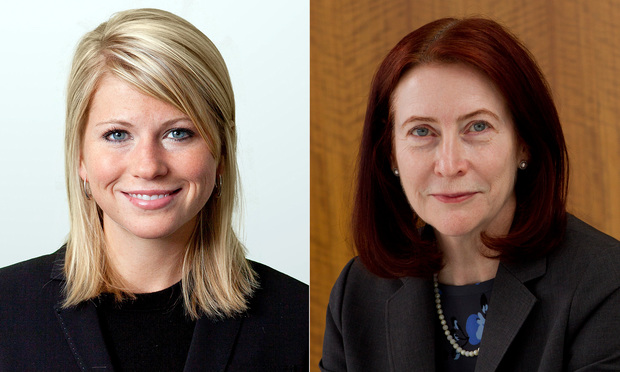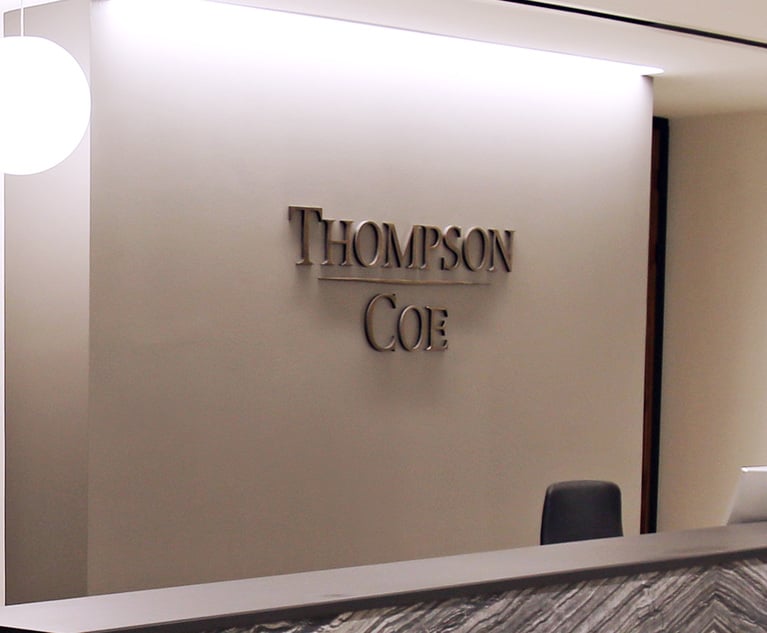'Do Better': Holland & Knight Team Asks SCOTUS to Review Bar's Approach to Mental Illness
They say the Illinois bar violated the Americans with Disabilities Act when it denied admission for a law-school graduate who is undergoing treatment. "They can't prove that they're worthy of a second chance unless we're willing to give them a second chance," Trisha Rich says.
June 09, 2020 at 05:50 PM
7 minute read
 Trisha Rich, left, and Laurie Webb Daniel of Holland & Knight.
Trisha Rich, left, and Laurie Webb Daniel of Holland & Knight.
Thomas Skelton was poised to join the Illinois bar after graduating from John Marshall Law School and passing the statewide exam in 2017. But he was tripped by one final hurdle when the committee on character and fitness declined to certify him, pointing to ongoing symptoms of mental illness. Experiencing delusional thoughts while his application was under review, Skelton sent approximately 40 emails to the committee's members impugning the integrity of their organization and the wider legal system.
Skelton's attorneys, Holland & Knight legal profession co-chair Trisha Rich and appellate chair Laurie Daniel, say the committee ignored testimony showing that he has his symptoms under control, thanks to medication. And they're now asking the U.S. Supreme Court to review a ruling by the Illinois justices that let the state bar committee's decision stand. They contend that the licensing board is violating the Americans with Disabilities Act by not providing Skelton reasonable accommodations in certifying his admission. Rich and Daniel spoke with ALM this week about the significance of their case, after filing their petition with the Supreme Court on Friday.
Dan Packel: How did the board go wrong on this issue?
Trisha Rich: Mr. Skelton's alleged bad behavior was a direct result of his medical condition. It's a behavior that is a manifestation of a diagnosed, and now treated, medical condition. For the board to point to that behavior, which frankly is fairly low-level inappropriate behavior, and say, "We're going to keep you out of the bar because of this," we think is a violation of the Americans with Disabilities Act.
DP: Has this issue, or variants on this issue, been litigated before?
TR: Not at this level. One of the frustrating things about not only character and fitness cases but bar discipline cases is that in most cases the petitioner is disincentivized from appeal processes like this one. Our client, for instance, could wait two years and apply again. In most cases, it is better for petitioners to not rock the boat, keep their nose clean and try again in two years.
Laurie Daniel: It's something of a case of first impression. That's partly because it's coming up through a unique forum. Every once in a while, though, you have something that comes up in a different avenue and presents a compelling issue, and we're hoping the court will recognize that here.
DP: With the increased focus in the profession on mental health pressures, is that one of the explanations for bringing the case forward in this fashion, rather than just the waiting for two years for another crack at it?
TR: I think our client's going to do both, right? Certainly, the increased visibility of mental health issues in the profession makes this a really interesting case for this time. Here, we have our client, who behaved in some pretty low-level inappropriate behavior that was a result of a mental health disorder that he subsequently was properly diagnosed with, properly treated with, and now has completely under control—and still is being frozen out of the Illinois bar.
Personally, I think that if we are going to be a profession that does care about mental health issues in the way that we say that we care about mental health issues, we have to do better by the lawyers and law students who go out and do all the things we asked for: get diagnoses, get treatment, are consistent with their treatment, are doing better. The frustrating thing is they can't prove that they're worthy of a second chance unless we're willing to give them a second chance.
DP: You make the argument in your brief that the Illinois Supreme Court's ruling will have a wider impact on attorneys dealing with mental health issues. What do you fear will happen if that decision stands?
TR: I think it has a chilling effect. We have a problem in the profession with mental health, and we want to encourage people to get better: enter the program, get the health they need and maintain that healthful lifestyle. What we think is really important is that when people do that, we show them that there is a path forward.
DP: Are there any other pieces of the puzzle that I haven't touched on?
LD: [This case] reminded me of a really significant mental health case that came down just slightly over 20 years ago, when I was asked to represent the ACLU as amicus curae in the Olmstead v. L.C. case. It wasn't your typical circuit-split type case. What that case entailed was the state of Georgia was taking mentally ill individuals and restricting them into institutional care even though their treating physicians had recommended that they be placed in community housing.
It was not a constitutional issue in front of the Supreme Court. The question there was whether the state had an obligation under the ADA to provide a reasonable accommodation. The Supreme Court granted cert and ruled in favor of L.C. For me, it was resounding, and that Olmstead case was a landmark decision for mental health. There's an institutional arrogance that I see coming through here that reminds me of institutional arrogance we saw by the state of Georgia, saying it could do whatever it wanted to segregate people with mental health issues.
It seems to me that the Illinois bar issue similarly reflects some institutional arrogance, where the bar acts like a sovereign and it's just going to decide things without providing the accommodation that's required by the ADA.
One of the disappointing things is that this case did have the treating physician testify, and there was not counter-testimony to what they were saying. You had five lawyers, who are laypeople who've not had any medical training, analyzing the medical testimony and substituting their own judgment over that of the treating physician.
My second point—you're probably familiar with the Stanford study [on expanding access to the legal profession for those with criminal records] that got released last year. One of the most helpful things they had in there is that the character and fitness committees should include people that have backgrounds in psychological disorders or mental health disorders. I think that would be really helpful for people like Mr. Skelton. We know that one-third of lawyers and law students have had some sort of mental health illness. I think it would make a lot of sense to incorporate people with that kind of training and background into the process.
Read More
Amid the Pandemic, These Law Firms Are Sticking With Their Mental Health Programs
Lawyers Reveal True Depth of Mental Health Struggles
'How Do You Get People to Care?' Firm Leaders, Experts Discuss Mental Health at LegalWeek 2020
This content has been archived. It is available through our partners, LexisNexis® and Bloomberg Law.
To view this content, please continue to their sites.
Not a Lexis Subscriber?
Subscribe Now
Not a Bloomberg Law Subscriber?
Subscribe Now
NOT FOR REPRINT
© 2025 ALM Global, LLC, All Rights Reserved. Request academic re-use from www.copyright.com. All other uses, submit a request to [email protected]. For more information visit Asset & Logo Licensing.
You Might Like
View All
KPMG Wants to Provide Legal Services in the US. Now All Eyes Are on Their Big Four Peers



K&L Gates Sheds Space, but Will Stay in Flagship Pittsburgh Office After Lease Renewal
Law Firms Mentioned
Trending Stories
- 111th Circuit Rejects Trump's Emergency Request as DOJ Prepares to Release Special Counsel's Final Report
- 2Supreme Court Takes Up Challenge to ACA Task Force
- 3'Tragedy of Unspeakable Proportions:' Could Edison, DWP, Face Lawsuits Over LA Wildfires?
- 4Meta Pulls Plug on DEI Programs
- 5On the Move and After Hours: Meyner and Landis; Cooper Levenson; Ogletree Deakins; Saiber
Who Got The Work
Michael G. Bongiorno, Andrew Scott Dulberg and Elizabeth E. Driscoll from Wilmer Cutler Pickering Hale and Dorr have stepped in to represent Symbotic Inc., an A.I.-enabled technology platform that focuses on increasing supply chain efficiency, and other defendants in a pending shareholder derivative lawsuit. The case, filed Oct. 2 in Massachusetts District Court by the Brown Law Firm on behalf of Stephen Austen, accuses certain officers and directors of misleading investors in regard to Symbotic's potential for margin growth by failing to disclose that the company was not equipped to timely deploy its systems or manage expenses through project delays. The case, assigned to U.S. District Judge Nathaniel M. Gorton, is 1:24-cv-12522, Austen v. Cohen et al.
Who Got The Work
Edmund Polubinski and Marie Killmond of Davis Polk & Wardwell have entered appearances for data platform software development company MongoDB and other defendants in a pending shareholder derivative lawsuit. The action, filed Oct. 7 in New York Southern District Court by the Brown Law Firm, accuses the company's directors and/or officers of falsely expressing confidence in the company’s restructuring of its sales incentive plan and downplaying the severity of decreases in its upfront commitments. The case is 1:24-cv-07594, Roy v. Ittycheria et al.
Who Got The Work
Amy O. Bruchs and Kurt F. Ellison of Michael Best & Friedrich have entered appearances for Epic Systems Corp. in a pending employment discrimination lawsuit. The suit was filed Sept. 7 in Wisconsin Western District Court by Levine Eisberner LLC and Siri & Glimstad on behalf of a project manager who claims that he was wrongfully terminated after applying for a religious exemption to the defendant's COVID-19 vaccine mandate. The case, assigned to U.S. Magistrate Judge Anita Marie Boor, is 3:24-cv-00630, Secker, Nathan v. Epic Systems Corporation.
Who Got The Work
David X. Sullivan, Thomas J. Finn and Gregory A. Hall from McCarter & English have entered appearances for Sunrun Installation Services in a pending civil rights lawsuit. The complaint was filed Sept. 4 in Connecticut District Court by attorney Robert M. Berke on behalf of former employee George Edward Steins, who was arrested and charged with employing an unregistered home improvement salesperson. The complaint alleges that had Sunrun informed the Connecticut Department of Consumer Protection that the plaintiff's employment had ended in 2017 and that he no longer held Sunrun's home improvement contractor license, he would not have been hit with charges, which were dismissed in May 2024. The case, assigned to U.S. District Judge Jeffrey A. Meyer, is 3:24-cv-01423, Steins v. Sunrun, Inc. et al.
Who Got The Work
Greenberg Traurig shareholder Joshua L. Raskin has entered an appearance for boohoo.com UK Ltd. in a pending patent infringement lawsuit. The suit, filed Sept. 3 in Texas Eastern District Court by Rozier Hardt McDonough on behalf of Alto Dynamics, asserts five patents related to an online shopping platform. The case, assigned to U.S. District Judge Rodney Gilstrap, is 2:24-cv-00719, Alto Dynamics, LLC v. boohoo.com UK Limited.
Featured Firms
Law Offices of Gary Martin Hays & Associates, P.C.
(470) 294-1674
Law Offices of Mark E. Salomone
(857) 444-6468
Smith & Hassler
(713) 739-1250










